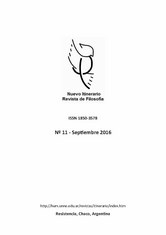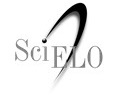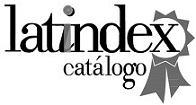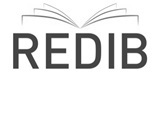Analytic Method and Lack of Synthesis in “The analytic Knowing” in Hegel’s Science of Logic
DOI:
https://doi.org/10.30972/nvt.1826199Keywords:
Hegel, Logic, Analytic, Synthetic, MethodAbstract
In “The idea of Knowing” of the Science of Logic, Hegel intends to deal with the analytic and synthetic methods, which have played an important role in modern science and modern philosophy. In this paper, I intend to study the subsection “The analytic knowing” in order to clarify its specific relevance to the rational development of Hegel’s Logic. In this sense, I state that “The analytic knowing” presents three topics that seem to be only slightly connected: the analytic method, arithmetic, and synthetic judgments a priori. The study of this section will show that there is a guiding thread: the lack of Fortgang or advance. Thus, I will state that the goal of this section is to exhibit different ways in which there may lack synthesis and advance, and, accordingly, the need to overcome this lack and leave open the path toward a conceptually more accurate treatment of the synthesis.
References
Caimi, M. Application of the Doctrine of Method in the critical examination of reason. Studia Kantiana, 13, 2012.
Caimi, M. et al. (2017). Diccionario de la filosofía crítica kantiana. Buenos Aires: Colihue.
Caimi, M. (2007). Introducción. En: Immanuel Kant. Crítica de la razón pura. Buenos Aires: Colihue.
Cassirer, E. (1943). Newton and Leibniz. The Philosophical Review, Vol. 52 (N. 4) 366-391.
Boer, K. de (2010) On Hegel. The sway of the negative. Hampshire: Palgrave Macmillan.
Echeverría, J. (1994). Influencia de las matemáticas en la emergencia de la filosofía moderna. En E. de Olazo (ed.), Enciclopedia Iberoamericana de Filosofía. Del Renacimiento a la Ilustración I (pp. 77-109). Madrid: Editorial Trotta.
Engfer, H.-J. (1982). Philosophie als Analysis: Studien zur Entwicklung philosophischer Analysiskonzeptionen unter dem Einfluss mathematischer Methodenmodelle im 17. Und frühen 18. Jahrhundert. Stuttgart-Bad Cannstatt: Frommann-Holzboog.
Falkenburg, B. (2020). Kant’s Cosmology. From the Pre-Critical System to the Antinomy of Pure Reason. Cham: Springer.
Hegel, G. W. F. (1982). Ciencia de la lógica. 2 tomos. (A. y R. Mondolfo). Buenos Aires: Ediciones Solar.
Hegel, G. W. F. (2015). Ciencia de la lógica. La doctrina del concepto. (F. Duque). Madrid: ABADA Editores.
Hegel, G. W. F. (1968ff). Gesammelte Werke. Hamburg: Meiner Verlag.
Hintikka, J., Remes, U. (1974). The Method of Analysis. Its Geometrical Origin and Its General Significance. Dordrecht/Boston: D. Reidel Publishing Company.
Kant, E. (1999). Prolegómenos a toda metafísica futura que haya de poder presentarse como ciencia. (M. Caimi). Madrid: Istmo.
Kant, I. (2007). Crítica de la razón pura. (M. Caimi). Buenos Aires: Colihue.
Kant, I. (1902ff). Kants Gesammelte Schriften. Vols 1–29. Berlin: de Gruyter.
Marrades Millet, J. Descartes, Newton y Hegel sobre el método de análisis y síntesis. Pensamiento, vol. 41, 1985, 404-6.
Moreau, P. F. (2014). Spinoza. Filosofía, física y ateísmo. Madrid: A. Machado Libros.
Pozzo, R. (1993). Analysis, Synthesis and Dialectic: Hegel’s answer to Aristotle, Newton and Kant. En: M. J. Petry. Hegel and Newtonianism (pp. 27-39). Dordrecht: Kluwer Academic Publishers.
Rinaldi, G. (2012). The “Idea of Knowing” in Hegel’s Logic. En: Giacomo Rinaldi. Absoluter Idealismus und zeitgenössische Philosophie. Absolute Idealism and Contemporary Philosophy. Bedeutung und Aktualität von Hegels Denken. Meaning and Up-to-dateness of Hegel’s Thought (pp. 53-74). Frankfurt am Main: Peter Lang.
Wehrle, W. E. (1993). The conflict between Newton’s analysis of configurations and Hegel’s conceptual analysis. En: M. J. Petry. Hegel and Newtonianism (pp. 17-26). Dordrecht: Kluwer Academic Publishers.
Downloads
Published
How to Cite
Issue
Section
License
Les autores ceden a Nuevo Itinerario los derechos de publicidad de sus trabajos, toda vez que hayan sido admitidos como parte de alguno de sus números. Ello no obstante, les autores retienen los derechos de propiedad intelectual y responsabilidad ética así como la posibilidad de dar difusión propia por los medios que consideren.












51.jpg)

